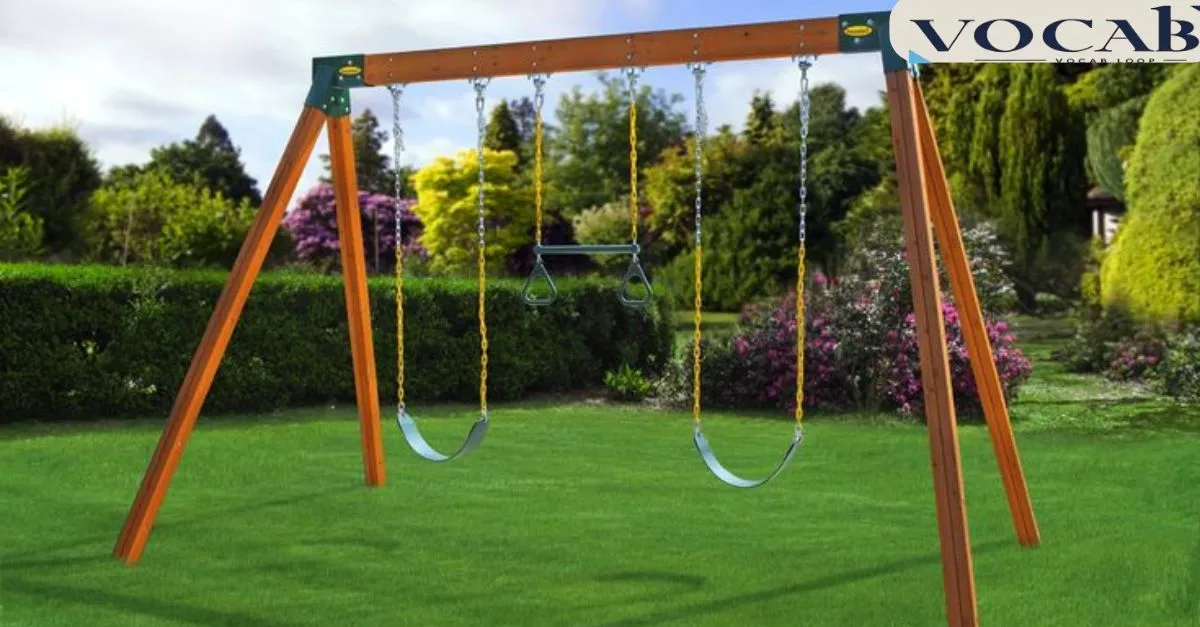Many have wondered whether they “swing,” “swang,” or “swung” that golf club yesterday. You’re not alone in this. English irregular verbs can trip up even the best of us. Today, we’ll unravel the mystery behind the past tense of “swing,” offering a quick and simple guide to verb conjugation.
English verbs can be tricky, and “swing” is no exception. It’s one of those that don’t follow the usual “-ed” rule, making things tough for learners. But don’t worry! By the end of this guide, you’ll be swinging through sentences like a pro.
Swing, Swang or Swung?

Let’s cut to the chase: the correct past tense of “swing” is “swung”. But why does this trip up so many people? The confusion often stems from the existence of other irregular verbs that follow different patterns. For instance:
- Sing → Sang
- Ring → Rang
- Spring → Sprang
It’s tempting to think “swing” would follow suit with “swang,” but English has other plans. This irregularity is part of what makes language learning such a thrilling (and sometimes frustrating) journey.
What’s the Past Tense of “Swing”?
To put it simply:
- Present tense: Swing
- Past tense: Swung
- Past participle: Swung
“Swing” belongs to a group of irregular verbs that maintain the same form for both the simple past tense and the past participle. Other verbs in this category include:
- Cling → Clung
- Fling → Flung
- Sting → Stung
This pattern, while not universal, is common enough to form a recognizable group within English irregular verbs.
Why the Past Tense is “Swung”?

The irregular nature of “swing” isn’t just a random quirk – it’s a linguistic fossil, preserving patterns from Old English. Many irregular verbs in modern English are remnants of an older system of verb conjugation that relied on vowel changes rather than suffixes to indicate tense.
In Old English, verbs were grouped into classes based on their conjugation patterns. “Swing” belonged to a class of verbs that underwent a vowel change from “i” to “u” in the past tense. This pattern has persisted, even as many other verbs have regularized over time.
Here’s a brief look at the historical evolution:
- Old English: swingan (infinitive) → swung (past tense)
- Middle English: swingen → swung
- Modern English: swing → swung
This persistence showcases the fascinating ways in which language preserves its history, even as it evolves.
How to Pronounce “Swing” and “Swung”
Mastering the pronunciation of “swing” and “swung” is crucial for clear communication. Let’s break it down:
Pronouncing “Swing”:
- IPA: /swɪŋ/
- Phonetic spelling: swiNG
- Key points:
- Start with the “sw” sound, like in “swim”
- The “i” is short, as in “pin”
- End with the “ng” sound, like in “ring”
Pronouncing “Swung”:
- IPA: /swʌŋ/
- Phonetic spelling: swuNG
- Key points:
- The “sw” sound remains the same as in “swing”
- The vowel sound changes to a short “u”, like in “sung”
- The “ng” ending is identical to “swing”
Practice tip: Try saying “swing” and “swung” back to back, focusing on the vowel change: “I swing, I swung, I have swung.”
What Does the Word “Swing” Mean?

“Swing” is a versatile word with multiple meanings across various contexts.
Here’s a breakdown of its primary definitions:
- As a verb:
- To move back and forth or from side to side while suspended
- To cause to move in a curving or circular path
- To shift or fluctuate
- In music, to play or sing with a fluid, rhythmic movement
- As a noun:
- A seat suspended by ropes or chains on which to swing
- The act of swinging
- A type of dance or music characterized by a strong rhythmic swing
- A shift in opinion or mood
Idiomatic uses:
- “In full swing”: At the height of activity
- “Swing into action”: To start doing something with energy
- “Swing both ways”: To be bisexual (colloquial)
A Simple Tense Table
Here’s a comprehensive tense table for “swing” in both British and American English:
| Tense | Conjugation |
| Simple Present | swing/swings |
| Simple Past | swung |
| Simple Future | will swing |
| Present Perfect | have/has swung |
| Past Perfect | had swung |
| Future Perfect | will have swung |
| Present Continuous | am/is/are swinging |
| Past Continuous | was/were swinging |
| Future Continuous | will be swinging |
| Present Perfect Continuous | have/has been swinging |
| Past Perfect Continuous | had been swinging |
| Future Perfect Continuous | will have been swinging |
Note: There’s no difference in conjugation between British and American English for “swing.”
Origins of the Word “Swing”

The word “swing” traces its linguistic roots back to the ancient Germanic languages, reflecting the dynamic nature of movement and rhythm:
- Proto-Germanic Roots: Derived from swinganą, meaning “to swing, turn, or rush.” This term signifies motion and flexibility, which are key to the modern meanings of “swing.”
- Old English: Known as swingan, meaning “to strike, rush, or fling oneself.” This definition hints at more forceful or deliberate movement.
- Cognates in Other Languages:
- Old Saxon and Old High German swingan: Both used to express similar meanings of rushing or moving forcefully.
- Dutch zwingen and German schwingen: These forms emphasize oscillating or waving motion.
- Emergence in Modern English:
- By the Middle Ages, swingan evolved to include the more playful or gentle movement associated with pendulums and swings.
- The musical sense of “swing” developed in the 1920s, popularized in jazz, capturing the rhythm and fluidity of the style.
Noun Formation: The noun “swing,” referring to a hanging seat or a rhythmic movement, began appearing in the 16th century, cementing its use in everyday life.
Synonyms of “Swing” and “Swung”
“Swing”:
- Oscillate
- Sway
- Rock
- Undulate
- Fluctuate
- Waver
- Dangle
- Pivot
- Rotate
- Gyrate
“Swung”:
- Rotated
- Pivoted
- Turned
- Veered
- Swerved
- Oscillated
- Fluctuated
- Shifted
- Lurched
- Swayed
Remember, while these synonyms can often be used interchangeably, the precise meaning may vary depending on the context. Always consider the specific nuance you want to convey when choosing a synonym.
Using “Swing” and “Swung” in Sentences
“Swing”:
- “The children love to swing on the backyard swing set.”
- “The pendulum swings in a smooth, rhythmic motion.”
- “He can swing a bat with remarkable precision.”
- “The trapeze artist can swing effortlessly through the air.”
- “Can you swing by the store on your way home?”
- “The vote might swing in favor of the opposition.”
- “The door swings shut automatically after a few seconds.”
- “They decided to swing their schedule to fit in more activities.”
- “Her mood tends to swing depending on the weather.”
- “The dancers started to swing to the upbeat jazz music.”
“Swung”:
- “The heavy gate swung shut with a loud creak.”
- “He swung his sword with all his might during the duel.”
- “The kids swung from the ropes tied to the tree branches.”
- “The chandelier swung dangerously during the earthquake.”
- “The conversation suddenly swung to an unrelated topic.”
- “She swung the racket and hit the ball out of the park.”
- “The dog swung its tail happily when it saw its owner.”
- “We swung by the café for a quick coffee before the meeting.”
- “The sign swung gently in the breeze outside the store.”
- “The firefighter swung his axe to break through the door.”
FAQs
1. Is “swang” ever correct to use?
No, “swang” is not standard in modern English. The correct past tense of “swing” is “swung,” used universally across all English dialects.
2. Why doesn’t “swing” follow the “sing → sang → sung” pattern?
While “swing” shares a similar root with verbs like “sing,” it belongs to a different group of irregular verbs that shift vowels differently (e.g., “cling → clung”). These patterns are remnants of Old English conjugation systems.
3. Can “swing” and “swung” be used metaphorically?
Yes! “Swing” and “swung” are often used metaphorically:
- Swing: “Opinions swing between extremes during debates.”
- Swung: “The mood swung from joy to sadness in moments.”
4. Are there differences in how “swing” is used in British and American English?
No significant differences exist in the usage or conjugation of “swing” between British and American English. Both use “swung” as the past tense and participle.
5. What are common idioms or phrases using “swing”?
- “In full swing”: Fully active or operational.
- “Swing and a miss”: An attempt that fails, often in sports or figuratively.
- “Swing by”: To visit briefly or casually.
Conclusion
Mastering the past tense of “swing” is more than just a grammar exercise – it’s a gateway to understanding the intricate tapestry of English verb conjugation. From its Germanic roots to its jazz-age evolution, “swing” embodies the dynamic nature of language itself.
By mastering the use of “swung” and understanding its historical roots, you’re not just memorizing a rule – you’re tapping into the evolution of language. Whether writing or speaking, using “swung” correctly enhances your communication. So next time you’re describing past actions, approach irregular verbs with confidence, knowing you’ve got the past tense of “swing” down. Language is about rhythm, and now you’re ready to swing with ease!
Remember:
- Present tense: swing
- Past tense: swung
- Past participle: swung

Alex Hormozi is a seasoned blogger at Vocab Loop, known for his deep insights into language, vocabulary, and grammar. With years of experience in writing, Alex shares practical tips and effective strategies to help readers improve their linguistic skills and enhance their writing abilities.

